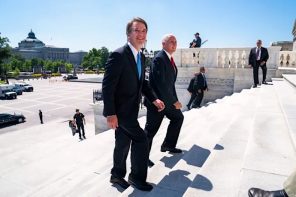Conservatives backing the right of religiously affiliated employers to refuse to do any paperwork in conjunction with opting out of contraceptive coverage in their health plans finally found an appeals court to agree with them.
The U.S. Court of Appeals for the Eighth Circuit ruled last week that the requirement that employers notify the Department of Health and Human Services of their intent to opt out of the Affordable Care Action’s contraceptive mandate did impose a substantial burden on their religious liberty under the Religious Freedom Restoration Act, saying:
[I]t is not our role to second-guess [the plaintiffs’] honest assessment of a ‘difficult and important question of religion and moral philosophy, namely, the circumstances under which it is wrong for a person to perform an act that is innocent in itself but that has the effect of enabling or facilitating the commission of an immoral act by another.’
Like the Little Sisters of the Poor and other plaintiffs, Dordt College, Heartland Christian College, and CNS International Ministries, claim that filling out the paperwork for the exemption from the coverage would trigger such coverage and, therefore, make them “morally and spiritually complicit in providing abortifacient coverage” since the plans are required to cover IUDs and emergency contraceptives. Seven other appeals courts have found otherwise, ruling that filling out paperwork wasn’t a matter of religious liberty but a basic necessity of civil administration, and that such paperwork would remove the plantiffs from the objectionable coverage, not trigger its provision.
The discordant ruling increases the chances that the Supreme Court will take up the issue, despite the fact that it based its own Hobby Lobby ruling on the existence of the accommodation to balance religious liberty claims with the government’s interest in ensuring that women have access to contraception. The plantiffs want contraception excluded entirely from their plans, even if it is provided by someone else, such as their insurer.
“The government keeps telling the Supreme Court ‘move along, nothing important here’ in hopes that the court will ignore this crucial issue. But with today’s decisions, the court will have great reason to decide this issue in the next term,” Lori Windham, senior counsel of the Becket Fund for Religious Liberty told the Washington Times.




